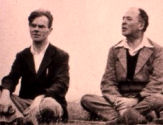
In Surprised by Joy, Lewis calls Barfield his “anti-self”. Barfield was to dedicate one of his key books to Lewis with William Blake’s adage: “Opposition is true friendship.” Soon after they met, they launched into a series of embattled discussions that they came to call their “Great War”.
It was the time during which Barfield laid down intellectual foundations to underpin his spiritual awakening, about which Lewis was profoundly skeptical. The future Christian apologist was far from any belief in theism at the time, and it seemed to him that Barfield was deluded.
So, where Barfield argued that the imagination was as important as reason for discerning and relating to the nature of things, Lewis prioritized reason and trusted cooler conceptual knowledge alone. Where Barfield noticed qualities of being echoing in his soul as he read poetry and myths, Lewis held that poetry and myth were meaningful insofar as they express human ideas only.
Barfield caught the difference in a letter to Lewis: “to me [truth] is not a sort of accurate copy or reflection of something, but it is reality itself taking the form of human consciousness.” You can awaken to the pulse that sustains existence and know it. Lewis remained doubtful.